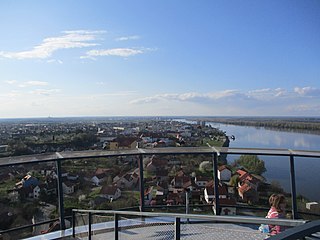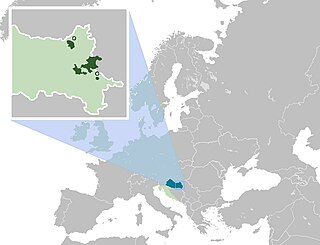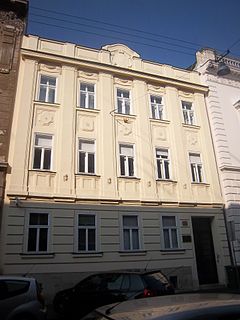
Vukovar is a city in Croatia, in the eastern region of Slavonia. It contains Croatia's largest river port, located at the confluence of the Vuka and the Danube. Vukovar is the seat of Vukovar-Syrmia County. The city's registered population was 26,468 in the 2011 census, with a total of 27,683 in the municipality.

Vukovar-Syrmia County, Vukovar-Sirmium County or Vukovar-Srijem County is the easternmost Croatian county. It includes the eastern parts of the region of Slavonia and the western parts of the region of Syrmia, as well as the lower Sava river basin, Posavina and Danube river basin Podunavlje. Due to the overlapping definitions of geographic regions, division on Slavonia and Syrmia approximately divides the county vertically into north-west and south-east half, while division on Posavina and Podunavlje divides it horizontally on north-east and south-west half.

Stari Jankovci is a village and a municipality in Vukovar-Syrmia County, Croatia

Borovo, also known as Borovo Selo, is a village and a municipality in Vukovar-Syrmia County in eastern Croatia.

Negoslavci is a village and a municipality in Vukovar-Syrmia County in eastern Croatia. It is located south of the town of Vukovar, seat of the county. Landscape of the Negoslavci Municipality is marked by the Pannonian Basin plains and agricultural fields of corn, wheat, common sunflower and sugar beet.

Trpinja is a village and an eponymous municipality in the Vukovar-Syrmia County in eastern Croatia. The village is located on the D55 road between Osijek and Vukovar. Landscape of the Trpinja Municipality is marked by the Pannonian Basin plains and agricultural fields of corn, wheat, common sunflower and sugar beet.

Orolik is a village in Stari Jankovci municipality, Vukovar-Syrmia County, in eastern Croatia. The village is connected with the rest of the country by the D46 state road conecting it with the town of Vinkovci and continuing into Serbia as the State Road 120 to the nearest town of Šid, D57 road and by the M105 railway.

Srijemske Laze is a village in Stari Jankovci municipality of Vukovar-Syrmia County in eastern Croatia. The village is physically connected with the village of Slakovci. According to 2011 census there is 566 residents in the village. The largest ethnic group in the village are Serbs of Croatia. The village is connected with the rest of the country by the D46 state road conecting it with the town of Vinkovci and continuing into Serbia as the State Road 120 to the nearest town of Šid. Surrounding landscape of the village is marked by the Pannonian Basin plains and agricultural fields of corn, wheat, common sunflower and sugar beet.

Slakovci is a village in Stari Jankovci municipality of Vukovar-Syrmia County in eastern Croatia. It is connected by the D46 state road. The village is physically connected with the village of Srijemske Laze. The village is connected with the rest of the country by the D46 state road conecting it with the town of Vinkovci and continuing into Serbia as the State Road 120 to the nearest town of Šid.

The Serb National Council is an elected political, consulting and coordinating body which acts as a form of self-government and autonomous cultural institution of the Serbs of Croatia in matters regarding civil rights and cultural identity. The council's main focuses are human, civil and national rights, as well the issues of Serbs of Croatia identity, participation and integration in the Croatian society.

The Kantakuzina Katarina Branković Serbian Orthodox Secondary School, also known as SPOG, is a coeducational gymnasium of the Metropolitanate of Zagreb, Ljubljana and all Italy in Zagreb, Croatia. It is the only high school of the Serbian Orthodox Church in the former Yugoslavia.

The Joint Council of Municipalities in Croatia is an elected consultative sui generis body which constitutes a form of cultural self-government of Serbs in the eastern Croatian Podunavlje region. The body was established in the initial aftermath of the Croatian War of Independence as a part of the international community's efforts to peacefully settle the conflict in self-proclaimed Eastern Slavonia, Baranya and Western Syrmia. The establishment of the ZVO was one of the explicit provisions of the Erdut Agreement which called upon the United Nations to establish its UNTAES transitional mission.

Radio Borovo is Serbian language radio station serving primarily Serb national minority in eastern Croatia. It has a local broadcasting license for the municipality of Borovo, Croatia. Its frequency is 100.7 MHz FM and it is heard in Vukovar-Srijem and Osijek-Baranja County and in Vojvodina in neighboring Serbia Radio Borovo is an independent radio station, privately owned, registered as a limited liability company - "Rhapsody", with 75% of initial capital owned by workers, and 25% owned by the municipality of Borovo. It is the most popular minority radio station in Croatia. It celebrated its twentieth anniversary in 2011. Due to its promotion of human and minority rights, it is often collaborates with the non-governmental sector.

Serbian Cultural Society "Prosvjeta" is the central independent cultural, educational and scientific institution of the Serbs in Croatia. Its primary aim is preservation and development of national identity.

Church of the Nativity of the Theotokos in Srijemske Laze is a Serbian Orthodox church in Vukovar-Syrmia County in eastern Croatia. Church is dedicated to Nativity of the Theotokos and was built in 1793. The building is listed in Register of Cultural Goods of Croatia. During the history building was renewed three times, in 1792, 1925 and 2003. Iconostasis with 21 icon was built in 1926. During World War II and Independent State of Croatia church movable property was taken away, and church was converted into Roman Catholic one.

The Serbs of Zagreb are a traditional minority group that lives in the Croatian capital Zagreb.

The Anti-Cyrillic protests in Croatia were a series of protests in late 2013 against the application of bilingualism in Vukovar, whereby Serbian and the Serbian Cyrillic alphabet were assigned co-official status due to the local minority population. The implementation of this decision became mandatory after the 2011 Croatian census, according to which Serbs in Vukovar comprise more than one-third (34.8%) of Vukovar's total population. Signs in the Serbian Cyrillic alphabet had been put up as the Constitutional Act on the Rights of National Minorities mandates bilingual signs in any area where more than one-third of the population belongs to an ethnic minority. This decision became subject of intense agitation by, among others, Croatian war veterans and many ordinary citizens who believe that due to events, particularly the Battle of Vukovar, the city should have been excluded from the application of the law on minority rights, although protests and vandalism have occurred in other towns and cities. The Serbs of Croatia are a minority group that have the narrowest usage of right to bilingualism among all national minorities in Croatia.
The Serbs of Vukovar are one of traditional communities living in the multicultural, multi-ethnic and multi-confessional eastern Croatian town of Vukovar. The Serb community constitutes slightly over one third of the entire population of Vukovar according to 2011 Census. Other significant communities include the Croat majority, as well as Hungarians, Slovaks, Rusyns, Ukrainians and historically Yugoslavs, Germans, Jews, Vlachs and Turks. The town is the seat of numerous ethnic organizations and institutions, including the headquarters of the Joint Council of Municipalities and the Independent Democratic Serb Party. The surrounding rural region is ethnically heterogeneous. The Serb rural communities constitute the majority in physically adjacent Borovo and the municipalities of Trpinja and Negoslavci. Vukovar lies on the state border with the Republic of Serbia yet the closest border crossings on Danube River are in Erdut and Ilok. Prominent Serbs from Croatia include Zaharije Orfelin and Siniša Mihajlović
Vukovar resolution was the document in which Serbs from Vukovar and neighboring communities, at the end of 1939 requested from central Yugoslav government exemption of Vukovar county from the Banovina of Croatia and its annexation to the Danube Banovina or future Banovina of Serbia.

Boris Milošević is a Croatian lawyer and politician who has been serving as Deputy Prime Minister of Croatia in charge of social affairs and human and minority rights since 23 July 2020. He is a member of the Independent Democratic Serb Party (SDSS). He previously served as the president of the Serb National Council from July 2019 until July 2020.


















